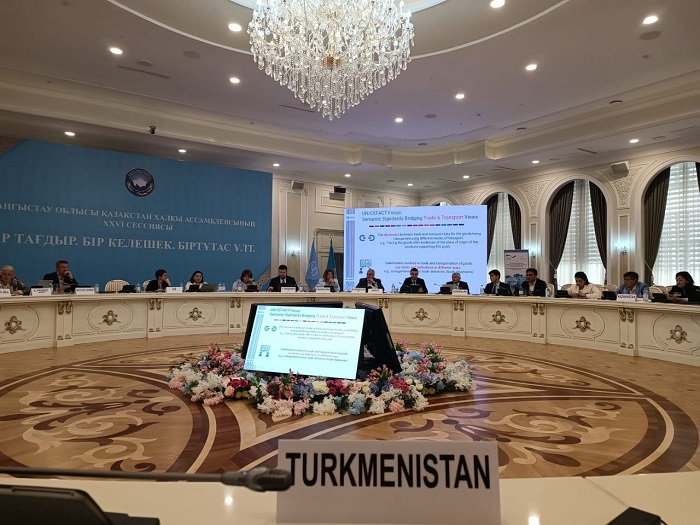The Turkmen Logistics Association, at the invitation of the German Society for International Cooperation (GIZ), participated in the 15th International Capacity-building Seminar on Trade and Transport Facilitation, which was held on 11-12 June in Aktau, Kazakhstan.
The seminar was organized by the United Nations Economic Commission for Europe (UNECE), the Ministry of Trade and Investment of Kazakhstan, the International Association Trans-Caspian International Transport Route (TMTM), as well as the German Society for International Cooperation (GIZ), the Permanent Secretariat of the Intergovernmental Commission on the Europe-Caucasus-Central Asia Transport Corridor (IPC TRACECA) and the Association “Ukrvneshtrans,” Turkmenlogistics reports.
The seminar is part of the activities aimed at the implementation of the SPECA Roadmap for Digitalization of Multimodal Data and Document Exchange along the Trans-Caspian Transport Corridor using legal instruments and UN standards, which was adopted in November 2023. This Roadmap, prepared with the support of the UNECE in 2022-2023, envisages action for the digitalization of multimodal data and document exchange along supply chains in the Trans-Caspian Corridor, using the semantic standards and Multimodal Transport Reference Data Model of the United Nations Centre for Trade Facilitation and Electronic Business (UN/CEFACT).
Following the goal of the Roadmap, the seminar was focused on the use of the UN/CEFACT standards in multimodal data exchange in the port community hubs of the Trans-Caspian Corridor, notably in the ports of Baku, Aktau, Kuryk, and Turkmenbashi.
The possibilities for digitalization of trade and transport documents accompanying goods (consignment notes, bills of lading, and additional documents) as part of the information flows on cargo along the corridors, were also discussed.
In addition, the possibility of concrete pilot testing of digitalization of information exchange in cooperation with TMTM, TRACECA and other development partners, as well as the possible launch of additional implementation projects with development partners, was considered.
Moreover, the seminar reviewed best practices in implementing port community systems in the transition economies of the region and issue recommendations for standardization of data and document exchange.
The workshop brought together policy makers and experts with technical skills from relevant national agencies dealing with digitalization, trade regulation, transport and transit procedures, as well as representatives of the business community (traders, carriers, forwarders, IT developers, etc.).
The participation of national experts, international organizations and the private sector will help to o prepare the recommendations as guidelines on how to use the UN/CEFACT semantic standards and Multimodal Transport Reference Data Model (MMT RDM) to enable multimodal interoperability in data flows along the Trans-Caspian and other SPECA corridors.
On the last day of the seminar, a study visit to the Kuryk port of Kazakhstan was also organized. ///nCa, 13 June 2024
